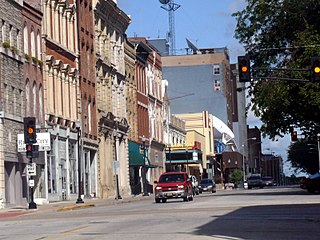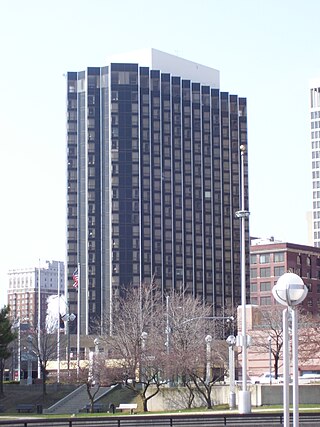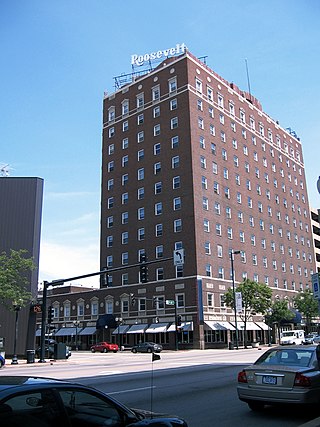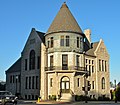
Quincy is a city in and the county seat of Adams County, Illinois, United States, located on the Mississippi River. The population was 39,463 as of the 2020 census, down from 40,633 in 2010. The Quincy micropolitan area had 114,649 residents.

Quincy University (QU) is a private Franciscan college in Quincy, Illinois, United States. Founded in 1860, it has an enrollment of approximately 1,300 undergraduate and graduate students across five constituent schools.

WGEM-TV is a television station licensed to Quincy, Illinois, United States, serving the Quincy, Illinois–Hannibal, Missouri–Keokuk, Iowa market as an affiliate of NBC, The CW Plus, and Fox. Owned by Gray Television, it is sister to the company's sole radio property, sports station WGEM-FM (105.1). Both stations share studios in the New Tremont Apartments on Hampshire Street in downtown Quincy. WGEM-TV's transmitter is located east of the city on Cannonball Road near I-172.
Marriott Hotels & Resorts is Marriott International's brand of full-service hotels and resorts based in Bethesda, Maryland. As of June 30, 2020, there were 582 hotels and resorts with 205,053 rooms operating under the brand, in addition to 160 hotels with 47,765 rooms planned for development.

Quincy Senior High School is the regional public high school for Quincy, Illinois. It is the largest high school in Adams County, Illinois, and the only high school in Quincy Public School District 172.

The Oakley-Lindsay Center is the regional convention center for Quincy, Illinois and the tri-state region. It opened in 1995 at a cost of $8 million. It serves as the convention hub of the Quincy micropolitan area and fills the market in-between St. Louis and Iowa City.

KHQA-TV is a television station licensed to Hannibal, Missouri, United States, serving the Quincy, Illinois–Hannibal, Missouri–Keokuk, Iowa market as an affiliate of CBS and ABC. The station is owned by the Sinclair Broadcast Group, and maintains studios on South 36th Street in Quincy; its transmitter is located northeast of the city on Cannonball Road near I-172.

WJJY-TV was a television station in Jacksonville, Illinois, United States, which broadcast from 1969 to 1971. It was the ABC affiliate for Quincy, Illinois, and served Springfield as well.

Downtown Paterson is the main commercial district of Paterson, Passaic County, in the U.S. state of New Jersey. The area is the oldest part of the city, along the banks of the Passaic River and its Great Falls. It is roughly bounded by Interstate 80, Garret Mountain Reservation, Route 19, Oliver Street, and Spruce Street on the south; the Passaic River, West Broadway, Cliff Street, North 3rd Street, Haledon Avenue, and the borough of Prospect Park on the west; and the Passaic River also to the north.

The South Side German Historic District is a neighborhood within Quincy, Illinois, United States just south of downtown. The neighborhood includes most of Quincy's rich German architecture. The region is also widely known as "Calftown", named for the number of calves once owned by its inhabitants. It was added into the National Register of Historic Places in 1992 with a boundary increase in 1995.

The Detroit Statler Hotel was a building located at 1539 Washington Boulevard across from Grand Circus Park between the David Whitney Building and the Hotel Tuller in Downtown Detroit, Michigan. In addition to Washington Boulevard, the hotel also fronted Bagley Street and Park Avenue.

Macomb station is an Amtrak intercity train station in Macomb, Illinois, United States. There is one daily morning train to Chicago. In the evening, the return train continues on to Quincy, Illinois. The station is a brick structure constructed around 1913 by the Chicago, Burlington and Quincy Railroad as designed by the railroad's architect Walter Theodore Krausch. The city of Macomb leases the station from BNSF Railway to prevent demolition and has done so since 1971.

The Fort Pontchartrain a Wyndham Hotel, is a 367-room, 25-story high-rise hotel opened in 1965, adjacent to former Cobo Hall, now Huntington Place in Downtown Detroit, Michigan.

The Club Quarters Hotel is a 16-story, 61.6 m (202 ft) Beaux-Arts high-rise at 710 Fannin Street in downtown Houston, Texas, United States. The building is listed on the National Register of Historic Places as the Texas State Hotel.

The STILE Downtown Los Angeles by Kasa, originally built as the California Petroleum Corporation Building and later known as the Texaco Building, is a 243 ft (74 m), 13-story highrise hotel and theater building located at 937 South Broadway in downtown Los Angeles, California. It was the tallest building in the city for one year after its completion in 1927, and was the tallest privately owned structure in Los Angeles until 1956. Its style is Spanish Gothic, patterned after Segovia Cathedral in Segovia, Spain.

The J. Mack Robinson College of Business Administration Building is a 14-story highrise at the corner of Broad and Marietta streets in the Fairlie-Poplar district of downtown Atlanta, which houses the business school of Georgia State University. When completed in 1901 as the Empire Building, it was the first steel-frame structure and the tallest in the city, until surpassed by the Candler Building in 1906.

The Putnam-Parker Block, also known as City Square, are historic structures located in downtown Davenport, Iowa, United States. The property includes three buildings that take up the south half of block 43 in what is known as LeClaire's First Addition. The main façade of the structures face south along West Second Street. They were listed on the National Register of Historic Places in 2011. In 2020, it was included as a contributing property in the Davenport Downtown Commercial Historic District. The former Putnam Building now houses a Marriott Autograph Collection hotel named The Current Iowa.

The Hotel Roosevelt is a historic structure located in downtown Cedar Rapids, Iowa, United States. It was individually listed on the National Register of Historic Places in 1991. In 2015 it was included as a contributing property in the Cedar Rapids Central Business District Commercial Historic District. The building is now known as the Roosevelt Lofts.
Fred Wesley Wentworth was an American architect known for his extensive contributions to the architectural landscape of Downtown Paterson, New Jersey, as well as various residences and theaters across northeastern New Jersey. Wentworth played a pivotal role in reshaping Paterson following a devastating wind-driven fire that destroyed much of the city's central business district in 1902. His architectural portfolio encompassed a diverse range of building types, including institutional, commercial, residential, religious, and healthcare structures, as well as some of the nation's earliest movie theaters designed exclusively for motion pictures. He was recognized as a Fellow of the American Institute of Architects.



























